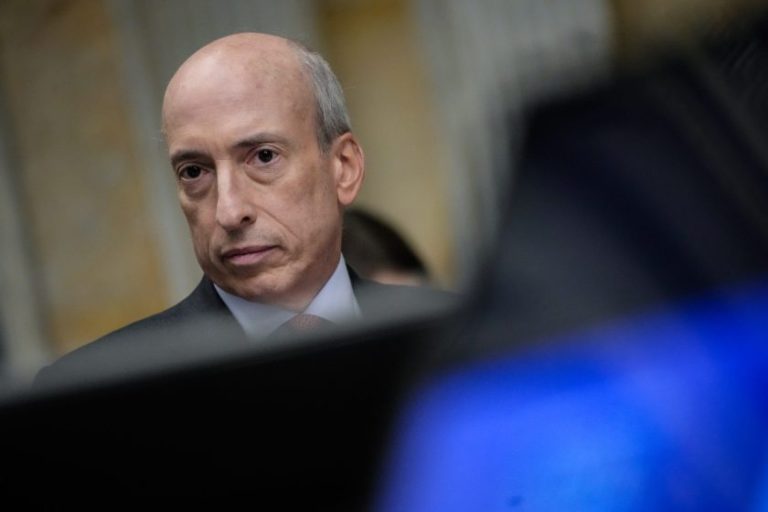
SEC Chairman Gary Gensler Drew Angerer – Getty Images
On Monday, a federal judge took the unprecedented step of imposing sanctions on the Securities and Exchange Commission in connection with a lawsuit the agency filed against Utah-based cryptocurrency company DEBT Box in July.
The case attracted widespread attention after the defendants accused the SEC of misrepresenting basic facts when the agency obtained a temporary restraining order to freeze assets on the cryptocurrency platform. After U.S. District Judge Robert Shelby ordered the SEC to explain its actions, the agency's lawyers acknowledged that the SEC had made mistakes, but asked Shelby not to issue a formal penalty.
In Monday's decision, Shelby denied the SEC's request, citing multiple instances of “bad faith” conduct and finding the agency liable for a “gross abuse of power.” In the 80-page filing, Shelby imposed a penalty in the form of requiring the agency to pay DEBT Box's attorneys' fees and costs related to the restraining order. The judge also denied the SEC's request to dismiss the lawsuit without prejudice, meaning the agency could file the lawsuit again later.
“[The SEC’s conduct] “Significantly undermined the integrity of these proceedings and the judicial process,” Shelby wrote.
“Bad faith behaviour”
DEBT Box is a little-known cryptocurrency company that offers investment tools in the form of “contract software licenses” that allow clients to mine various digital assets. The Securities and Exchange Commission first sued the company in July, alleging that the venture defrauded investors out of nearly $50 million by selling unregistered securities. Before the case could come to light, the agency took the drastic step of ordering from one side Temporary Restraining Order – An unusual step that does not notify the defendant of the proceedings, and is typically only granted when there is a serious risk that they will destroy evidence or flee the United States. In the DEBT Box case, the SEC claimed that the company was actively closing his bank accounts and seeking to exit the country.
While Shelby initially granted the SEC's request, attorneys for the defendants later suggested that the agency had misrepresented information in its request for the restraining order, including that the company was aware of the investigation and was taking steps to flee the country. In a December order, Shelby asked the SEC to present evidence to support the restraining order.
A few weeks later, the agency filed a response acknowledging the errors, with SEC enforcement chief Gurbir Grewal apologizing for the “shortcomings” in the case. However, the agency's lawyers asked Shelby to waive the penalties, arguing that its employees had not engaged in “bad faith conduct.” In January, the SEC moved to dismiss the case without prejudice, again arguing that sanctions were inappropriate and that case law dictated that the agency should not be on the hook for financial penalties.
Despite the agency's apology, the case quickly became a lightning rod for both the cryptocurrency industry and sympathetic politicians who have long complained about the zealous enforcement push against the blockchain sector under President Gary Gensler. In February, a group of Republican senators sent a letter to Gensler expressing concern about the lawsuit, arguing that trust in the agency had been “undermined.”
Shelby's ruling Monday is a vindication for DEBT Box and the SEC's critics, with the judge finding that the agency understood the crucial evidence used to obtain the restraining order “lacks any basis.”
However, “the committee presented that evidence in intentionally false and misleading ways,” Shelby wrote.
In his decision, Shelby took particular issue with the SEC's position as a federal agency, as the agency's lawyers cited its “special standing” when seeking the restraining order. By granting the preliminary injunction, “life was turned upside down,” Shelby wrote. Moreover, he said, the SEC not only repeated factual errors in subsequent statements, but presented “new lies to the court.”
“The court cannot write off these cases as inadvertent and unintentional errors,” he wrote, concluding that the agency made “strategic decisions” to provide questionable information because the attorneys knew they would not have obtained the restraining order and asset freeze.
With leading cryptocurrency companies embroiled in lawsuits before the Securities and Exchange Commission, the strongly worded decision will increase scrutiny of Gensler's approach to policing the industry. “The committee just imposed a bill on every one of us for their litigation misconduct.” chirp Paul Grewal, chief legal officer at Coinbase, whose company is currently seeking to dismiss a lawsuit filed by the Securities and Exchange Commission alleging that the exchange's business model violates securities law.
“We are reviewing the decision,” an SEC spokesperson said in response to a request for comment. luck.

